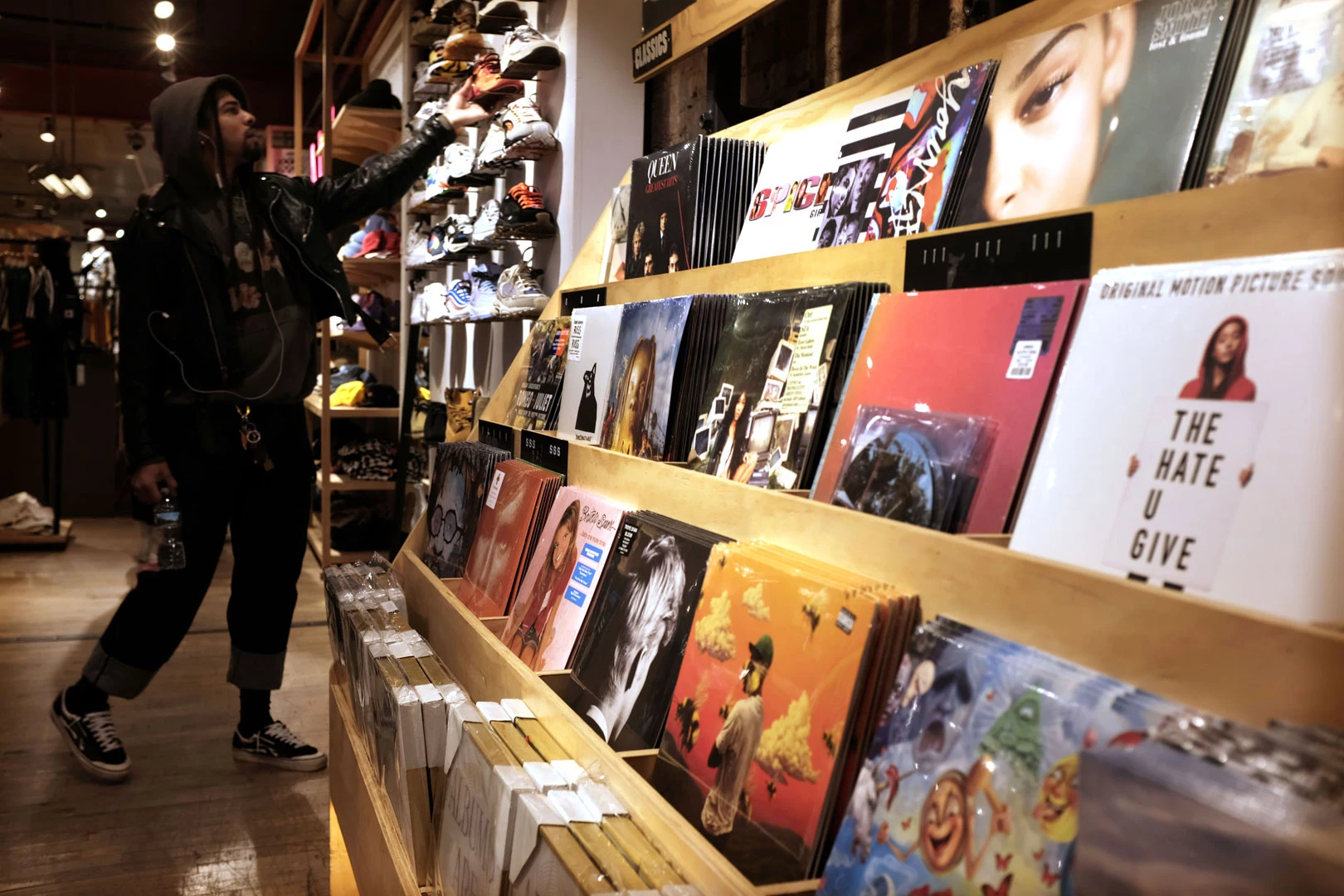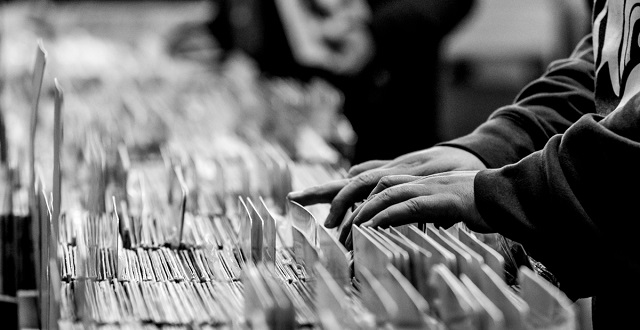
All images courtesy of Getty Images

By Andrew Daly
[email protected]
What is Record Store Day to you? For a lot of you who are new to vinyl, “RSD” as it’s often abbreviated, is a day to go out and buy all the super new and fun exclusive titles. For those of us who have been in the game for a long time, RSD can at times be a day to roll one’s eyes and sigh. Why? The answer is simple, and complex all the same. Maybe you’re confused by my meaning. Wasn’t RSD started as a means to help indie shops garner business? The short answer is, on the surface — yes. The long answer is far more convoluted and much more sinister.
If you haven’t noticed, we live in a greedy world, driven by capitalism. It’s sort of a reverse funnel effect, where we all suffocate at the bottom, drowning in pennies, while all our money is sucked up into a proverbial vacuum and soaked up like a sponge by the elite. So, what does this have to do with RSD? In short – everything. The truth is, I used to love RSD, and part of me still does. I do, at the very least, still like it. That’s why even as I write this, I am very conflicted. I used to download the list in anticipation of it, and I would make lists of all the shiny new toys I was about to bring home.
Over the last couple of RSDs however, I began to see a trend. First, I noticed the prices were going up, up, up, and the quality of the releases was going down, down, down. Second, I learned that record stores make next to nothing on new vinyl. They are basically strong-armed into buying all this product, or they will be left out of the party and have no one in their store on a day that was supposed to be all about them. Tim Clair, the owner of Record Reserve, one of my local shops, can be quoted as saying, “Ten years ago, people came in for the RSD product, and bought used vinyl as well. Lately, they just show up for the RSD titles. Shops are lucky if they break even on their investment. Maybe by now, people have all the used vinyl they need?” So, if RSD is supposed to be about supporting independent record stores, then how is it that corporate entities basically extorting them into selling their lowest margin product in bulk supposed to help them?
Did you know that RSD product is non-returnable? Have you ever noticed that long after RSD is over, that your local shops still have exclusive RSD products available from 2017? That’s right. The product your local store is forced into buying theirs to be stuck with when not if, they don’t sell it all. What this means is, if you’re shop isn’t extremely shrewd in their ordering process, they will literally be stuck with dead inventory years later that they are forced to sell at a loss. The result of this is smaller shops are now fearful of participating in RSD as they can’t afford to sacrifice working capital and add to their overhead when they know they won’t move half of it. It’s simple economics, and it’s bad business. So, now what we have left is the bigger stores and the corporate chains participating in RSD only, as they are the only ones that can basically use RSD as a loss leader in hopes of selling other products while people are there. Sounds kind of scary, right? For us, these shops are entertainment. For the owners, it’s their livelihood. It’s how their feed their families.
Drilling down into the reality of what RSD is becoming is sad, but it’s not at all shocking. The whole operation has become so far removed from the manner in which real, live indie records shops operate, survive, and thrive. I put emphasis on SURVIVE and THRIVE as RSD as it is currently constituted does not fully and truly promote this. In a way, RSD has become something that is actually both damaging and damning to smaller record shops, and to the industry itself. Large hoards of “collectors” standing outside stores at some ridiculous hour in the morning so they can be ripped off for overpriced, and at times tone-deaf releases, is not promoting the best of what indie record shops have to offer. Record shops and record collecting is about exploration and the love of music. Not trampling one another for an expensive colored reissue of a record you can buy used for 75-90% less.
Did you know that record stores make next to no money on new vinyl? Yes, it’s 100% true. Don’t believe me? Next time you’re in your favorite small shop, go ask the owner what his margin is on new vinyl. It’s probably 5-10%, or maybe 15% if they’re lucky. Do you truly think an industry strong-arming the little guy into peddling overpriced reissues is in their best interest? A couple of years back, I participated in RSD. I went to a few shops and scored the releases I wanted. I was happy. My last stop was Record Reserve, the most indie of indie shops here on Long Island. All-day I had battled crowds, and so when I walked into this last shop and saw there was literally no one in the store, I was extremely confused. I asked the owner how his day had been so far, and he told me, “It’s been terrible. I’ve been open for 4 hours, and haven’t had a single customer. I couldn’t afford any of the RSD releases, so no one is stopping in.” It stung to hear that. I felt a wave of guilt wash over me as I realized I had just spent hundreds on all this RSD product while my favorite indie shop, the very shop that is supposed to be supported and benefit from this day, struggled with no customers.
In many ways, RSD has become one giant corporate record label promotion opportunity. Small, helpless indie record shops have become a vehicle for the marketing binge. Look at it from a simple business and economic perspective. First, the grand lead-up to the day sees local shops with a dramatic fall in sales. These are important sales as used vinyl keeps its lights on. Why does this happen? Simple – the masses are saving their money for the RSD product. Here’s another fact – the vast majority of record shops do not report better quarterly figures with the advent of RSD. Second, indie shops are about the underground aspect of this niche hobby, but RSD is at times leading to the watering down of it all with boring, tired, unnecessary releases, with little to no artistic merit. Most indie shops truly aim to give their regular and loyal customers real value for their money. RSD can at times make it nearly impossible to do that.
I mentioned the risk shops take by buying into RSD each year. These small shops take a massive forced leap of faith by laying out their working capital for this product in hopes of a small return. Who’s taking the risk here? I can tell you it’s not the labels, and it’s not the distribution chains. They are covered ten-fold. It’s the shops that live and die by a prayer and a penny. The risk is not fairly distributed amongst the players. Did you know that your favorite small shops often take loans just to participate in RSD? You read that right: taking loans to buy stock for low-margin sales with no option to return. The end result is your favorite shop is nothing more than a pawn in a giant advertising campaign to leap onto the bandwagon being driven by the wealthy and the poseurs. Your favorite shops are being taken advantage of, and so are you.
The final unspoken effect RSD has is the massive logjam it creates in pressing plants. All of this stuff usually comes out on one day (not this year), and so, in the six-month build-up toward RSD, the pressing plants are stuffed to the gills with RSD releases, which inevitably delays all the other releases we actually do want, and that are actually awesome. The result is two-fold. First, pressing quality and quality control goes down the toilet. You get warped records, misaligned spindle holes, ripped, bent, and creased spines and jackets. Second, the indie labels can’t get anything pressed or out in the interim. Ever wonder why some of your favorite indie labels go dormant or die altogether? Simple: they can’t get their product pressed, they don’t have the cache or the money to get ahead in line in front of the big boys, and they don’t have the means to press their own stuff. The end result is poor quality garbage being peddled as exclusive.

Record store day was supposed to be a day of celebration of the indie shop. I ask an open question: has RSD become another celebration of corporate greed in America? The facts are all there. A simple google search and basic understanding of business economics will give you a lot of information, but there is another side to this. Yes, the whole process is now catering to vultures, flippers, and hipsters, and at times leaving the real music fans out in the cold. I wonder, do any of these “collectors” even purchase physical music any other day of the year, or do they just come out of their caves to suck blood and charge us hundreds of dollars on eBay later? That being said, there is still a large part of me that loves RSD. I have emphasized throughout this article that some of the releases are at times tone-deaf, but still, there is a small percentage of them that are awesome. I want those, and I would be a liar if I told you that this year I didn’t go out and get them. Shops can participate, or be left out in the cold. That’s the state of things. I truly believe that. I am not calling for a boycott; just the opposite. I know that at least in the beginning, RSD had good intentions, but like everything and everyone else – it all seems to give way to greed in the end. I feel we have the power to turn this around.
The reality is that greed on RSD has the very real power to kill small shops. What I personally try to do is make sure I visit all my local shops, give them business and buy used vinyl in addition to any RSD releases I pick up. Those of us that are real, true, dyed-in-the-wool record nerds have to do our part to combat the vultures. The last piece of advice I can give is – do not engage with the flippers online after the fact. No matter how much you wanted that Spacehog Resident Alien release this year, don’t go on eBay and pay $150.00 for it. It’s that kind of behavior that keeps the vicious cycle spinning. Going forward, we all have a choice to make. Do we succumb to FOMO, and watch small shop after small shop shudder its doors? Once that happens, what will we be left with? No, I believe we all should go out on RSD each year, but let’s all remember to do so with the best intentions of our friends in these shops. The entire point of RSD is to help them move forward. So, let’s make sure that we do our part to keep them around for a long time, and move forward with them, not without them.

– Andrew Daly (@vwmusicrocks) is the Editor-in-Chief for www.vwmusicrocks.com and may be reached at [email protected]
